- Home
- Joseph Bruchac
Talking Leaves Page 2
Talking Leaves Read online
Page 2
Still, I have to admit that seeing her has almost made me wonder what it would be like to have a little sister such as her, to not be the only young person in my mother’s home. But that is not what I want. I have no desire at all to get to know her. I have never spoken to either her or her mother. I do not think they know who I am.
“Uwohali,” my mother says again. “What is it?”
She already knows the answer. I do not have to say it. I want to go to the big cabin of my father’s second wife on the other side of Willstown. I want to see my father. I want to ask him to teach me things.
“Why don’t you want to keep learning from your uncles?” she asks. “There is still much they can teach you.”
Her words are true. Red Bird was closest to me, but he was not my only uncle. His older brothers, Blackbird and White Raven, have a lot they could teach me. They know much about the new world in which our people must live. Both of them have learned to speak English. They are as well known by their English names of John and Samuel as they are by their Indian names. Both are deeply involved in the politics of our nation. The first elections for our new Tsalagi legislature take place this fall. Everyone says that one of them will surely be chosen to go to New Echota as one of the four representatives from our district.
But, unlike Red Bird, they both have children of their own and they are as devoted to them as my father, Sequoyah, was neglectful of me. They do not have all that much time for me. They travel so much and are so busy that I seldom see them.
Also, the path my mother’s two remaining brothers have chosen is not really the one I want to follow. Politics does not interest me. I do not enjoy trying to convince people to like me better than they like someone else. I want to know how to make things, useful things.
Nor do I want to continue taking classes in English from the missionary, even though he has said I am a quick learner. No one, he told me, has learned to write the alphabet faster than me. And when I speak the Aniyonega words I have learned, I do so perfectly—or so he said.
That missionary, Reverend Worcester, is a kind man. Like many of the Aniyonega he likes our Tsalagi people and wishes to assist us. He believes that teaching us to read and write English will not just make it easier for him to “save our souls,” as he puts it. He believes it will help us to resist being forced to leave our homeland.
I like Reverend Worcester. I like many of the other white people I have met. It is only some of the Aniyonega—those who are greedy for our land—who wish to drive us away. Unfortunately, those few who wish to get rid of us are powerful men. And one of the most powerful of those who wish to remove us is one who said he was our friend.
Perhaps that is why learning more English, which is the language of those who have betrayed and cheated us, does not interest me.
“Uwohali,” my mother says, “did you hear what I just asked you?”
Ah, as it sometimes happens with me, my thoughts have made me drift away. What was it my mother asked? Oh yes, now I remember. She asked why I was so determined to go to see my father.
“My father can teach me how to work silver,” I say. “He can teach me to work iron at his forge. Everyone says that no one can draw or paint, or carve, or do blacksmithing as well as my father.”
My mother nods.
“That is true,” she agrees. “Sequoyah is a great artist. When we were first married he drew a picture of a redbird for me. It was so real I thought that it would spread its wings and fly up off the page. And as I have told you before, no one was a better blacksmith.”
Then she takes in a deep breath, as she always does when she has not yet made her point. “He could teach you. But will he? Does he do any of that these days? All he does is show people his strange markings and tell them stories that are . . .”
My mother pauses. She wipes her hands down her apron as if dusting off flour. I know what word she was about to say before she stopped herself. It is the word everyone uses to describe my father. Crazy.
I don’t reply. I stand up and take a few steps forward to look out at the river. This is a conversation we’ve had before. Seven times by my count—at least once every few days since Sequoyah’s return.
I hear my mother sigh again from behind me. Then I hear her feet coming down the steps and walking toward me. I turn to look at her.
She pushes that strand of long hair back from her face. She puts her left hand on my shoulder. She has to reach up to do that. Though I am only thirteen, I’m taller than she is.
“Uwohali,” she says, “my big eagle.”
My mother’s hands are strong from all the work she does. Chopping and carrying wood, repairing the fences that hold in Complainer, our mule, feeding the pigs, and milking the three cows. She even takes a hand in the plowing, which we will soon be doing when the days have grown a little longer and all the frost is out of the earth. Everyone says that she is stronger than most men. My uncles and I are always ready to help, but just as often as not she shoos us off and says that she wants to do it herself.
So when she squeezes my shoulder it hurts a little. But not quite as much as the pain I begin to feel in my heart. For I can sense that she is finally about to grant me permission to do what I want.
“You need to go,” she says to me. Then she takes her hand from my shoulder and walks back into the cabin.
You need to go.
Those are the same words she spoke years ago to my father.
Those words ended their marriage. No Cherokee man would be foolish enough to try to argue when a Cherokee woman tells him that their marriage has ended. When women speak, men must always listen.
But I know that her words to me, though the same, hold a different meaning. My father will never again be her husband. But I will always be her son.
My mother says I am as stubborn as my father. She says I am like him in the way that I will not give up once my mind is set on something.
I just hope that I will succeed.
“Uwohali.”
My mother is standing at the door of the cabin with a bowl of squirrel stew in her left hand and a big piece of corn bread in her right. There is a smile on her face again.
“Your squirrels will be upset if you do not eat the stew they gave you before you leave,” she says.
CHAPTER 3
Sitting and Thinking
I am sitting with my back against an oak tree, passing my chunkey stick back and forth from one hand to the other. It did not take me long to walk here. But I have been here for some time now, long enough for the sun to climb beyond the middle of the sky. People I know have walked or ridden by me. Some have nodded or raised a hand in greeting.
“Osiyo, Uwohali.”
“Osiyo.”
But they have seen from my posture that I do not wish to be disturbed. Our people are very good at reading such subtle signs. If you do not wish to be bothered, they will leave you alone.
But that does not keep them from gossiping about you. What was cooked in a very small pot but provided more that enough for everyone to eat? The answer to that riddle is gossip. Although there are many people here in Willstown, it seems as if everyone always knows what everyone else is doing—or is said to have done. That is especially true if you are the son of the man more people are talking about now than any other person.
“I saw the son of Sequoyah. He was sitting in the cold under a tree and staring at the house where his father is staying.”
“Ah, that is sad.”
“Uu! Yes. I think that poor foolish boy hopes his crazy father may be able to teach him something.”
But they may end up saying worse things than that. From the gossip I’ve heard, some people are deeply suspicious of him. Some are even saying that Sequoyah is an evil sorcerer. He went west only to learn more magic and has returned to work bad medicine on people. One of those is the man who just rode past me with a
sour look on his face. He saw me but did not even nod his head in my direction. His name is Tall Man and he is the father of my friend Galuloi.
I am sure that when Tall Man gets home he will tell everyone in his family where he saw me. He may even tell his son to keep away from me.
My stepmother’s place is impressive. It is not just the sturdy well-built log cabin that is bigger than my mother’s. Though the two chairs on the porch are empty, smoke is rising from the chimney, and I know that someone is home. The place is well kept. It does not look as it did just before my father went to Arkansas.
I was heeding my mother’s words back then and staying away from my father. So I did not see how it appeared when he was living there. But I am told that everything was looking run-down. Tall grass and weeds grew in the garden behind the cabin. When he left and my stepmother began taking care of things herself everything improved.
Of course appearance is not the most important thing. In fact, if you are too proud of how good your property looks or how handsome or beautiful you are, people may remind you of the story about Possum and his tail.
Back long ago, Possum was very proud of how he looked. The hair on his tail was thick and bushy, long and silky. He was always combing it and boasting about how beautiful it looked. He would sing this song about that tail of his:
He nio dil dil
Ha que que la lo
The other animals got tired of hearing him boasting like that. They got tired of hearing him always singing that irritating song again and again.
He nio dil dil
Ha que que la lo
So they went to Cricket.
“Go to his house at night,” they said to Cricket. “Cut all the hairs off his tail while he is sleeping.”
So Cricket did as they asked. He waited till Possum was asleep and then crossed over the creek to Possum’s house. He cut off all the hairs on Possum’s tail and then crept away.
The next day, Possum woke up and started to comb his tail as he always did every morning. But when he did so, all of those hairs came right off because Cricket had cut them.
And ever since then Possum has had the ugliest tail of all the animals.
Even though I was very young then, I remember my father’s soft voice telling that story. It was not long after he told it that he left us when my mother ended their marriage.
I wish I had heard more of his stories, stories that I am sure he has told the daughter he had with my stepmother, Sally Guess. The thought of him telling her stories instead of me makes me feel sad—and also jealous of this half sister I’ve only seen but never met.
Next to the house is my stepmother’s store. Sally Guess has run it by herself for several years. Until he lost interest in it, my father worked there with her. Sequoyah was known by everyone as a friendly trader who would trust people and give them credit. He kept track of everything in a book. Because he never wished to learn to write English, he drew a sketch of each customer and then made little marks—circles and lines of different sizes—to indicate how much they owed him.
Storekeeping was something he had learned from his mother when he was a boy in Taskigee. Taskigee was one of our biggest and most important upper towns, located north and east of here on the Little Tennessee River. This was before the white men came and burned Taskigee, before our people were forced to give up our upper towns and move here. It was at Taskigee that my grandmother had met the white man named Guess who is said to have been my grandfather. I have heard that it was a brief romance, and he moved on without knowing that she would give birth to his son nine months later. I know little about him except that some say he was a soldier and others that he was a traveling trader. All he left behind him was the white name that my father has always used. George Guess.
I never met my grandmother,Wuhteh. She left this life and went to the Darkening Land before I was born. But I feel as if I know her from what my mother shared with me about her.
My mother told me about my grandmother six years ago, not long after my father left us. We were outside, sitting next to the fire, and she was making stew from the squirrels I’d shot with my blowgun. Even then, at the age of eight, I was putting Uncle Red Bird’s lessons about hunting into practice.
“Wuhteh, your father’s mother,” my mother said as she stirred the pot, “she was a true Tsalagi woman, strong and independent.”
I remember smiling when my mother said that because she might as well have been describing herself. Even as a small child, I knew how strong my mother was.
“Left on her own,” my mother continued, “without a husband and with a small child, your grandmother did not give up. After all, among our people a woman is always the head of the family. Clan members are just as important to her as any husband. And that is true for her children, who inherit that clan from their mother’s side. That is why, like me, you belong to the Bird Clan while your father is Paint Clan just like his mother.”
She held out a spoonful of the stew. “Here, taste this.”
I remember how good that stew tasted. It was wonderful, as always. But before I could say anything my mother shook her head. “Needs more seasoning, doesn’t it?”
My mother reached into one of her jars of herbs, crumbled up several dried leaves, and shook them into the pot.
“So,” she said, “Wuhteh was not really on her own. With the help of her family and her other clan members, she began to trade. And she did well in that business, so well that when he was still a young boy, just a bit older than you, your father began to help her.”
My mother paused and lifted her head toward the sunset direction—as if someone was approaching. I looked, but there was no one to be seen. She shook her head and continued her story.
“It was not easy for your father. A childhood accident and sickness had weakened one of his legs and made him lame. But he made up for that by being a hard worker and he excelled at everything he tried. He took over the trading from his mother and did even better than she had done. He was also a great artist. He spoke well and was a wonderful singer. He had such a strong gentle voice. From the first day we met, I knew I wanted him for my husband.”
My mother went back to stirring the stew. It seemed that she had finished her story, but I wanted to know more.
“Can you tell me?” I asked. “What was it like then with my father?”
My mother pushed back her graying braid and sighed deeply. “It was not easy,” she said. Then she struck her stirring spoon hard against the side of the metal pot. “And now I will talk no longer because this stew is done.”
I haven’t thought of that conversation with my mother for a while. But now that Sequoyah has returned from Arkansas, all of those memories are coming back to me. And thinking about him makes me wonder again about what it was like in those days when my father was a young trader.
Back then our nation’s boundaries were double what they are today and the peace town of Echota was the capital of our nation. Thousands of deer hides were brought in every year to my father’s store in Taskigee by our Tsalagi hunters. Then the white men moved in and killed all of the deer. And then our leaders were forced to sign yet another treaty and Taskigee and Echota were lost to us.
We are like the man in a story that my father told me when I was little. I was too young to understand it then as I do now. Perhaps my father understood that, but also understood me well enough to know that I would not forget it and that its meaning would one day be as clear to me as it is today. Or maybe he just told me that story because he was feeling sad and had been drinking. The smell of alcohol was strong on his breath and his voice was slurred as he told the story.
“A Tsalagi man was sitting by the river on a log,” my father said. “Along came a white man.
“‘Can I join you, my friend?’ the white man asked.
“‘Yes, my friend,’ the Tsalagi man answered, moving over to
make room for his new companion.
“But then another white man came along and another . . . and another.
“Each time the Tsalagi man moved over to make room. So it went until finally the Tsalagi man was pushed off the end of the log, fell into the river, and was swept away.”
I remember how I waited to hear what happened next. Did the Tsalagi man drown? Were the white men ever punished for what they did?
But my father just shook his head, got up, and walked away, his steps unsteady from drink.
I need to stop thinking about such things. Those thoughts are darker than the feathers of a raven. I turn my gaze again to the buildings across the road from me.
Next to the house is a low-roofed open-sided building. It looks a little like an arbor, such as the one behind my mother’s small cabin. Almost every Tsalagi home has such an arbor for the warm months of long days. That is when everyone moves outside to cook our food and sleep at night cooled by the breeze that comes up from the river.
But this building, a building that his second wife had made for my father’s use, is not an arbor. The things that I can see within it are not meant for cooking. There’s a forge, an anvil, and hammers. Though little used, it contains everything needed for the profession I would like to learn. It’s a blacksmith shop.
My father, Sequoyah, was one of the first Cherokees to become a blacksmith. No one taught him that trade. He learned it the way we have always learned things—by watching. He went to the blacksmith shops of white men and sat outside, carefully observing them at their work. He saw how they used the bellows to make the fire hot enough to melt iron. He saw how their forges were constructed, how they used buckets of water to cool the red-hot metal. Then, when he knew enough, he began to do his own blacksmithing. Soon everyone was coming to him to get their horses shod or to have things made of iron.

 Peacemaker
Peacemaker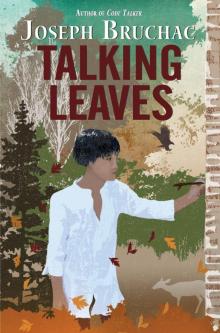 Talking Leaves
Talking Leaves Found
Found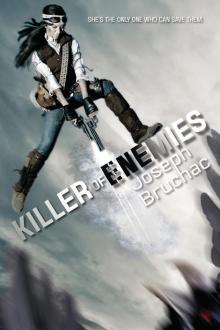 Killer of Enemies
Killer of Enemies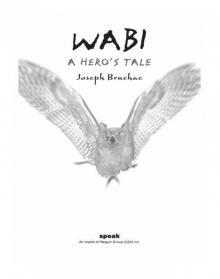 Wabi
Wabi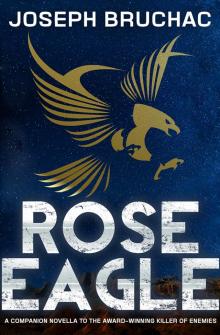 Rose Eagle
Rose Eagle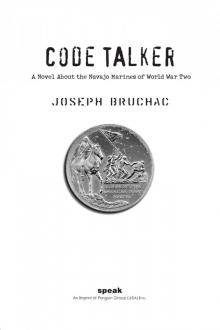 Code Talker
Code Talker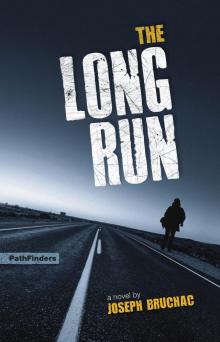 The Long Run
The Long Run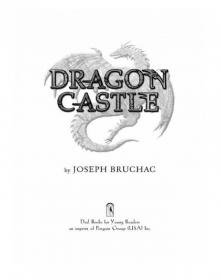 Dragon Castle
Dragon Castle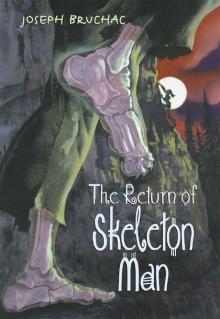 The Return of Skeleton Man
The Return of Skeleton Man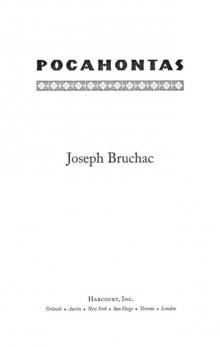 Pocahontas
Pocahontas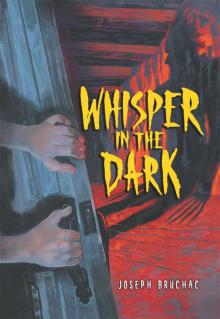 Whisper in the Dark
Whisper in the Dark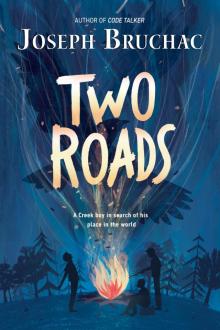 Two Roads
Two Roads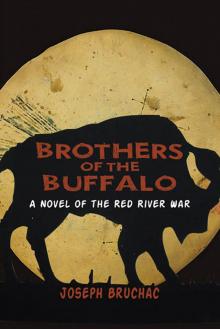 Brothers of the Buffalo
Brothers of the Buffalo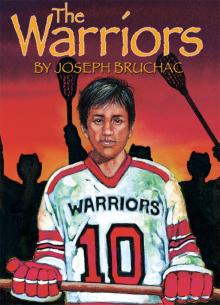 The Warriors
The Warriors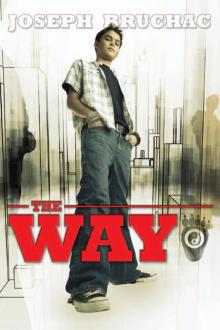 The Way
The Way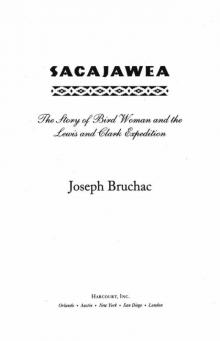 Sacajawea
Sacajawea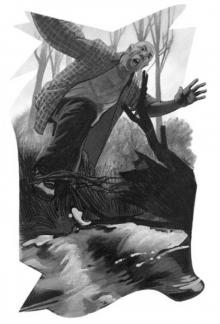 Night Wings
Night Wings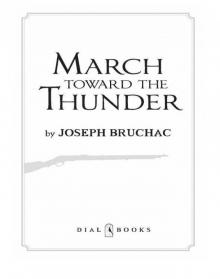 March Toward the Thunder
March Toward the Thunder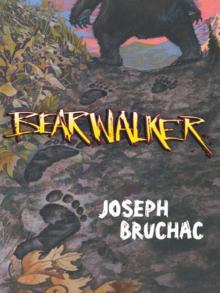 Bearwalker
Bearwalker Skeleton Man
Skeleton Man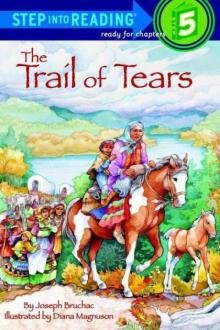 The Trail of Tears
The Trail of Tears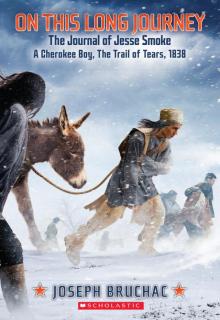 On This Long Journey
On This Long Journey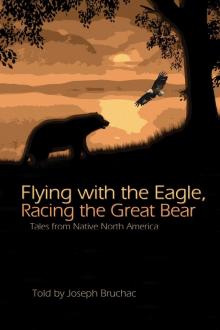 Flying with the Eagle, Racing the Great Bear
Flying with the Eagle, Racing the Great Bear